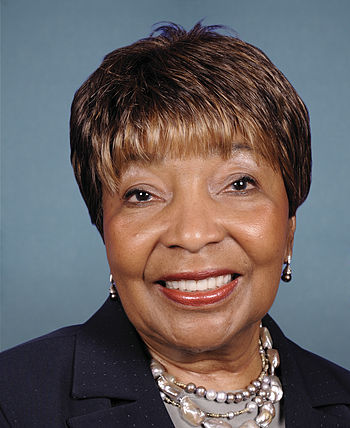May 29, 2014
Representative Johnson Weighs in on the FIRST Act
Posted by Nick Saab
“The following is a blog entry written by Representative Eddie Bernice Johnson (D-Texas-30th District), Ranking Member on the House Science, Space, and Technology Committee. The Congresswoman is a longtime supporter of federal investment in science and STEM education, and as such we invited her to write a blog post sharing her views on the FIRST Act with AGU members.”
Written by Congresswoman Eddie Bernice Johnson
In 2007, the House Committee on Science, Space, and Technology passed bipartisan, landmark legislation based on recommendations from the 2005 National Academies’ report Rising Above the Gathering Storm. The report found that the scientific and technological building blocks critical to our economic leadership were eroding at a time when many other nations were gaining strength. The
America Competes Reauthorization Act of 2010 continued the Committee’s commitment to strengthen American competitiveness through sustained investments in science, innovation, and education. Those bills authorized the National Science Foundation (NSF), the National Institute of Standards and Technology (NIST), the Office of Science at the
Department of Energy (DOE), and innovation programs at the Department of Commerce (DOC) for three years with forward-looking growth trajectories and important new policy directions – creating ARPA-E at DOE; setting the stage for the development of coordinated federal public access policies; updating the merit-review process at NSF; increasing the overall impact of federal STEM education investments; improving the quality of K-12 STEM teachers; strengthening NSF’s role in bringing graduate education into the 21st century; promoting greater access and equity in STEM education at all levels; creating and strengthening innovation and economic development programs at DOC; and much more.
Yesterday, the House Committee on Science, Space, and Technology passed H.R. 4186, the Frontiers in Innovation, Research, Science, and Technology (FIRST) Act of 2014, out of Committee on a party-line vote. The FIRST Act attempts to replace parts of the Competes legislation. Unfortunately, the FIRST Act does not carry the message, spirit, or bold new policy directions of the first two Competes Acts. In addition, it arbitrarily splits off the DOE programs from consideration as part of Competes.
The FIRST bill has numerous problems that make it completely unacceptable. For example, it includes detailed funding allocations in the NSF authorization. This Committee did not make such allocations in the previous three NSF authorizations. Instead, we gave the experts in the agency and the scientific community the flexibility to respond in real time to the changing frontiers of science. Not only has the Majority taken that authority away from the real experts, but they have decided to slash the funding levels for the social sciences and the geosciences. There is no legitimate scientific reason for these cuts. These are politically motivated cuts to appease a conservative ideology that doesn’t believe in certain kinds of science, such as climate science, and I cannot support them.
The Committee received over 20 letters from various scientific, academic, and industry associations and societies expressing concern or opposition to the FIRST Act, and, in a move that may have been unprecedented, last month the National Science Board issued a statement outlining its concerns with the FIRST Act.
The America Competes Act is one of the crowning achievements of the Science Committee. It sought to ensure our commitment to maintaining our scientific and technological leadership now and long into the future. What we did yesterday with the FIRST Act not only fails to advance our science and innovation enterprise, it actually damages it. The issue of national competitiveness should be a bipartisan one, but though I and the other Democratic Members of the Committee made every effort to improve this misguided and flawed piece of legislation, we were rebuffed at every turn. It was a sad day for the Science Committee.




[…] and champions have been eager to have what should be a relatively easy policy debate. With the fireworks surrounding the FIRST Act last year, and no sign that the atmosphere has changed allowing for constructive debate and […]